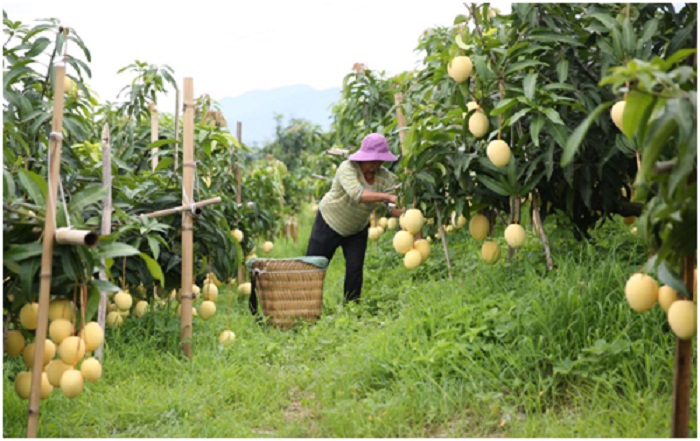



Deep in the rolling mountains along both sides of the Jinsha River in Lijiang, southwest China’s Yunnan province, people in a riverside village are busying pruning mango trees after their mangoes have all been sold out.
Making the most of its abundant resources of light, heat, and water, Longjing village in Huaping county has been making great efforts to boost the development of mango industry in recent years.
In 2019, the mango planting area of Longjing village reached 15,000 mu (1,000 hectares), and the annual per capita net income of the village rose to 16,000 yuan (about $2,444.8). As of October 2020, all the impoverished people in Longjing village had got rid of poverty.
“Since we intensified efforts to improve the quality of the fruit and our work efficiency, the mango production of our village has doubled that of last year. That has made everyone work harder and become more confident about the development of the industry,” said Li Xiangyang, Party chief of the village.
In the past, coal industry was the pillar industry of Huaping county. The output value of coal industry even accounted for 70 percent of the total industrial output value of the county for a time. Therefore, most of the people in Longjing village used to work in local coal mines for a living.
However, Huaping county is also the largest major producing area of high-quality late-maturing mangoes in Yunnan province. And Longjing village has turned the fruit into “golden fruit” that freed it from poverty and led it into prosperity.
The annual average temperature of Longjing village is 21.9 degrees Celsius, and its frost-free period lasts over 300 days a year, which serve as advantageous conditions for the village’s efforts to develop stereoscopic cultivation, Li noted.
As more and more families have become better off by growing mango trees, many poor people have been inspired to join in the trend. Li Yuangui, a villager whose family was recognized as a registered poor household in 2014, is one of them.
With the help of the local government, Li planted more than 30 mu of mango trees, which can now bring him an annual income of more than 100,000 yuan.
Today, basically all the families in Longjing village have mango trees, according to Li Xiangyang.
Longjing village has a total of 236 households, among which 41 used to be poor households. Thanks to the guidance of the poverty alleviation working group stationed in the village and local officials, 90 percent of these poor households in the village have planted mango trees, the official disclosed.
Ding Shunfu, a man from a once poor household of Longjing village, started to grow mango trees in 2015. Due to his lack of knowledge of planting techniques, all the mango trees he planted had failed to bear fruits.
In an effort to solve such problem, Longjing village began organizing training in farming skills to improve the quality of fruit and efficiency of mango cultivation.
At least two training sessions have been held in Longjing village every year. These sessions have been mainly designed for families that were once registered poor households and households that lived on subsistence allowances.
“These villagers lacked knowledge of planting techniques and experience in mango cultivation, the results of their work would’ve been greatly reduced if they had merely relied on traditional ways to plant and manage the trees,” explained Liang Jie, head of the poverty alleviation working group.
“We are promoting green and organic farming now, which has made our fruit better and more popular,” Liang added.
After receiving training in mango cultivation, Ding has continuously expanded the mango planting area of his family, increasing which from about four mu at the beginning to more than 30 mu today.
Besides training local villagers in planting skills, Longjing village has also tried to improve its road condition to facilitate the development of mango industry.
“This section of the road used to be unsurfaced. It’s rather difficult to pass through this place in rainy days. When mangoes were harvested during rainy season, we could hardly take the fruit out of the village,” Li Yuangui recalled, pointing to a section of a brand new hardened road that extends over 10 kilometers.
His home is located in Yunpanshan village, a natural village under the administration of Longjing village. In November 2018, the newly hardened road connecting Yunpanshan village with the rest of Longjing village was open to traffic, making it significantly more convenient for people in the natural village to travel and sell agricultural products.
Today, all villagers’ groups of Longjing village have hardened roads, and these roads lead to the door of every household.
More than 300 people from over 80 households have directly benefited from the great improvement in the local transportation condition, which has not only made it easier for villagers to get to the outside world, but brought more buyers for mangoes to the village.
Longjing village has established a village-level mango trading venue, Li Xiangyang disclosed, saying that the village has invested nearly one million yuan in cold storage and improvements on products packaging, and that buyers for mangoes are directly introduced by the cooperative of the village.
Moreover, more than 50 percent of the villagers’ groups of Longjing village have been covered by broadband services, according to Li.
“The next plan of Longjing village will be connecting our products to e-commerce so as to sell mangoes to farther places,” Li said.


The Humanitarian Service Diamond Awards has.
A Chinese Company, Inner Galaxy Steel.


The Programme Coordinator, Regulatory, Compliance and.


A Non-Governmental Organization (NGO), Committee for.
The Trustfund Pensions Limited has chided.


The House of Representatives Committee on.
The China General Chamber of Commerce.


Senator Chuka Utazi who represented Enugu.


An Abuja based Legal Practitioner, Ugochukwu.


The African business community in Yiwu,.
Leave a Comment